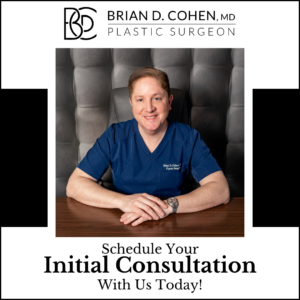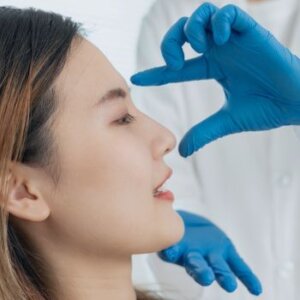Cohen Plastic Surgery | Revision Rhinoplasty in NYC
Dr. Cohen graduated cum laude from the University of Pennsylvania and then went on to receive his medical degree with honors from the Albert Einstein College of Medicine. He was also inducted into the Alpha Omega Alpha Honor Medical Society. Following medical school, Dr. Cohen was accepted into a highly competitive 6 year combined residency position at New York-Presbyterian Hospital. During that time, Dr. Cohen completed his prerequisite general surgery training at the Columbia University Medical Center campus, where he received the Housestaff of the Year Award after a nomination by the nursing staff for providing “exemplary and compassionate care.”

Dr. Cohen then went on to complete three years of training in Plastic & Reconstructive Surgery at Columbia, as well as at Weill-Cornell Medical Center, Memorial Sloan Kettering Cancer Center, Hospital for Special Surgery, Lenox Hill Hospital and Manhattan Eye Ear and Throat Hospital. Dr. Cohen served as Administrative Chief Resident in Plastic & Reconstructive Surgery, as he oversaw the rotation scheduling and curriculum planning for his junior residents. He went on to receive the Distinguished Housestaff Award from the Cornell Medical Center Alumni Council for “exemplary all-around service” as a chief resident.
After his residency, Dr. Cohen then decided to pursue an additional year of cosmetic surgery fellowship training at the prestigious New York Eye & Ear Infirmary under the tutelage of Dr. Donald Wood-Smith, a pioneer in plastic surgery. During this fellowship, Dr. Cohen was able to focus his attention on cosmetic procedures of the face, eyes, nose, breast, and body. He helped to oversee one of the busiest cosmetic surgery clinics in Manhattan. Dr. Cohen has authored many internationally published journal articles and book chapters on topics such as eyebrow and eyelid rejuvenation and breast augmentation and serves as a Manuscript Reviewer for the journal Aesthetic Plastic Surgery. He has also delivered presentations at several national meetings. He remains informed of the latest developments in the field of plastic surgery through his membership in several professional organizations.
What To Expect From Revision Rhinoplasty in NYC
For individuals seeking improvement after a previous procedure, a transformative surgical experience can open the door to enhanced results. This corrective surgery addresses issues such as asymmetry, breathing complications, or aesthetic desires that didn’t align with the initial rhinoplasty. A thorough consultation is vital for evaluating past surgical outcomes and setting realistic expectations, which are crucial for a successful journey. Various surgical techniques may be employed, with options for anesthesia tailored to each patient’s specific needs. Effective Revision Rhinoplasty in NYC at Cohen Plastic Surgery with recovery requires diligent post-operative care, particularly in managing common concerns like edema and bruising.
Understanding The Recovery Timeline
The journey to regaining one’s health is a multifaceted process that requires awareness of various stages and the accompanying challenges. Successful recovery hinges on understanding these phases and managing expectations related to pain and healing.
- Immediate Post-Operative Recovery (Days 1-7): During this initial period, expect considerable discomfort and swelling around the surgical site. Adequate rest and the application of ice are essential to mitigate inflammation. Pain control is often handled with over-the-counter drugs recommended by your surgeon.
- Early Recovery (Weeks 2-4): As the days progress, watch for a noticeable decrease in swelling. This stage requires careful consideration of pain management options, including analgesics and over-the-counter drugs, while the surgeon addresses the nasal septum deviation involving cartilage, ensuring minimal risk to the skin and eye during the plastic surgery process, and emphasizing the importance of exercise for recovery and facial aesthetics.
Managing Pain After Surgery
Experiencing discomfort after a surgical procedure is a common challenge that can significantly influence the healing process. Effective pain management strategies are essential for a smooth recovery and may involve various approaches. Medications are frequently prescribed to alleviate pain, with options ranging from opioids to non-opioids, each offering distinct benefits and potential side effects. Adhering to medical guidelines ensures safe and effective use of these medications. Alongside pharmacological interventions, incorporating non-pharmacological methods can also play a vital role in reducing discomfort. Techniques such as heat therapy and physical therapy not only help with pain but can also facilitate the overall recovery journey. Maintaining proper nutrition and hydration is crucial for successful healing. It is vital to engage in communication with your surgeon regarding pain levels, enabling the development of a personalized pain management plan that addresses your specific needs during the rhinoplasty recovery process.
Tips For A Smooth Healing Process
The journey to recovery is an essential aspect of any surgical intervention, especially after cosmetic procedures. Successful recovery involves careful planning and awareness of the healing process following primary rhinoplasty. Many individuals may misunderstand how long it can take to witness the final results after the initial procedure. Adhering to post-operative instructions is crucial, as it helps minimize complications and supports a smoother recovery experience. Engaging in gentle activities can be beneficial during this time, but it’s imperative to avoid strenuous exercise or heavy lifting. Paying close attention to any signs of complications allows for timely intervention, ensuring that the healing process remains on track. A balanced diet rich in essential nutrients is vital, as certain vitamins and protein support tissue repair during recovery. Staying informed about the healing process and potential outcomes of revision rhinoplasty may help patients feel more confident during their recovery.
What To Expect From Your Surgeon
Effective interaction with your healthcare provider significantly influences the overall experience surrounding a surgical procedure. It enables you to voice your concerns and expectations clearly, fostering an environment of trust that is essential for any successful interaction in plastic and reconstructive surgery. Establishing achievable objectives is also critical. Grasping what can realistically be accomplished through various procedures, whether discussing a first rhinoplasty or a revision rhinoplasty in NYC, allows you to communicate your motivations and desired results effectively. This ensures that your expectations align closely with the actual outcomes of the surgery. Prior to your appointments, it’s beneficial to formulate specific questions for your healthcare provider. Take into account what is most important to you, such as recovery from revision rhinoplasty, as it plays a crucial role in the success of your surgery and your overall satisfaction with the results.
Effective Interaction with Healthcare Providers
- Clear communication improves patient satisfaction and trust in healthcare settings.
- Setting realistic goals can lead to better alignment between patient expectations and surgical outcomes.
- Preparing specific questions for healthcare providers enhances the quality of the consultation and addresses patient concerns.
- Understanding the recovery process is vital for assessing the overall success of surgical procedures.
Caring For Your Nose Post-Surgery
Ensuring a smooth recovery journey is vital for anyone undergoing cosmetic procedures involving the nose. Proper care during the first few days after surgery is crucial for reducing swelling and preventing complications. Adhering to the specific instructions provided by your rhinoplasty surgeon will help promote optimal healing. It’s important to clean the surgical area gently with the recommended products, steering clear of harsh chemicals that could irritate the skin. Managing prescribed pain relief medication as directed will play a key role in your comfort. Maintaining daily hygiene practices is essential for rhinoplasty patients. Keeping the nose and face clean while avoiding irritants, such as smoke or strong odors, will aid in recovery. Be sure to consult with a board-certified plastic surgeon who is experienced in revision rhinoplasty, as they can provide the best advice and options for candidates seeking to improve their results from previous surgeries, especially after the initial surgery and during the months and year following the procedure, considering factors such as healing in the first few days and six weeks after surgery, and the overall appearance of the nose and face.
Navigating Risks And Complications
Understanding the potential hazards associated with surgical procedures is vital for anyone considering an operation. Common risks encountered during nose surgeries include infection, scarring, and bleeding, all of which can complicate recovery. For example, secondary rhinoplasty surgery may introduce unique challenges, particularly for patients with a history of prior procedures. To minimize these risks, it is crucial to choose a qualified surgeon. Engaging in a detailed discussion about your medical history and adhering to pre-operative instructions can significantly enhance safety. Recognizing complications is essential for prompt intervention; symptoms such as redness, swelling, and fever may indicate an infection, while excessive pain could signal issues with the healing process. Regular follow-up visits are vital to ensure that any problems are addressed quickly, helping to ensure a smoother recovery after secondary rhinoplasty surgery, which can vary in complexity between closed and open rhinoplasty techniques.
Nose Surgeries
- Infections, scarring, and bleeding are common risks associated with nose surgeries.
- Secondary rhinoplasty surgery can present unique challenges, especially for patients with previous surgeries.
- Choosing a qualified surgeon and discussing medical history can significantly reduce surgical risks.
- Symptoms like redness, swelling, and excessive pain should prompt immediate medical attention to address potential complications.
Importance Of Follow-Up Appointments
Post-operative care is a vital element in achieving the best recovery outcomes after any surgery. Follow-up visits are crucial for monitoring how well your nose heals and ensuring that the body responds positively to the complex surgery. During these follow-up appointments, medical professionals perform a thorough examination of the surgical site. They assess the bridge of your nose and address any discomfort or unusual symptoms that may arise during recovery. Discussing concerns at these appointments can facilitate timely intervention for potential issues. Adhering to post-operative instructions significantly enhances overall satisfaction with the surgical outcome and can impact how well your nose heals. optimal aesthetic results and help ensure that your nose heals properly after the complex surgery of rhinoplasty, facilitating the benefits of Revision Rhinoplasty in NYC if needed.
Preparing For Your Revision Surgery
Embarking on a journey that involves modifying the appearance of your nose can be both exciting and daunting. Understanding the complexities of this procedure, known as revision rhinoplasty, is crucial for alleviating anxiety. Gathering comprehensive information about the procedure’s purpose and techniques will empower you throughout this process. It is essential to have an open discussion with your surgeon to clarify the steps involved, as revision rhinoplasty is often more complex than initial interventions. Setting realistic expectations regarding outcomes will help you cope better with potential risks associated with surgery. Keep in mind that the structure of your nose may take up to a year for your nose to fully heal. Mentally prepare by incorporating relaxation techniques into your routine, while also adhering closely to the post-operative care instructions provided by your surgeon to ensure that your nose has fully healed and you achieve the desired results from your Revision Rhinoplasty in NYC procedure.

